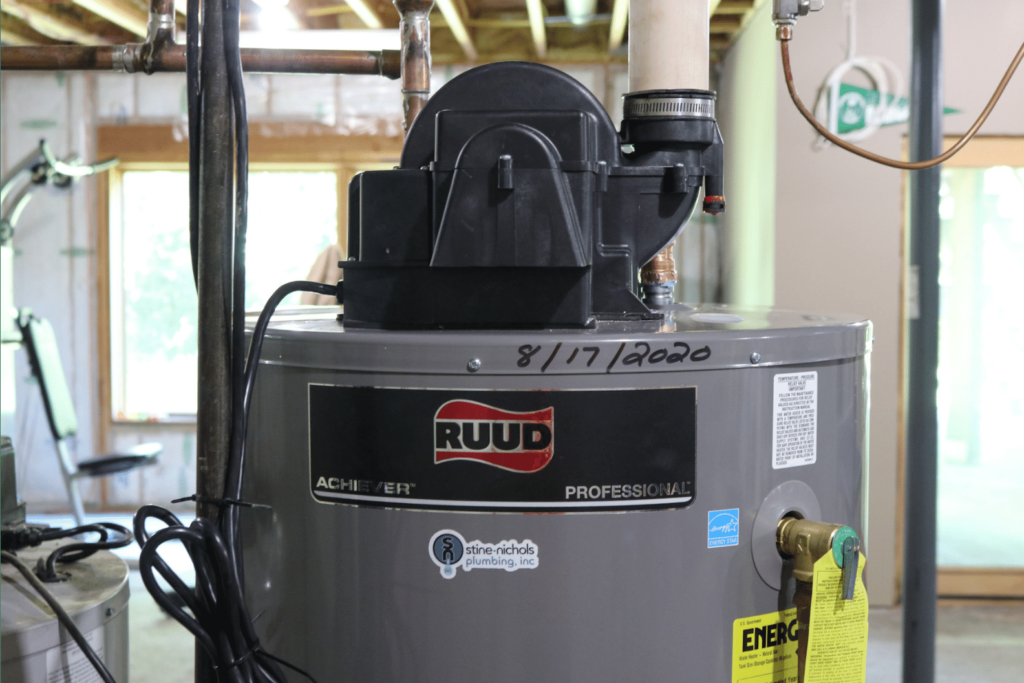When you oversee all of the various components to a complete plumbing system, it’s safe to say you may run across some terms you’ve never heard before. This is especially the case if you recently became a first-time homeowner. In this week’s blog, we’re going to take a look at a word you’ll probably see when researching water heaters. That term is “power vent.” While not everyone certainly needs a power vent installed, there are plenty of cases where it can be useful. Throughout this post, I’ll walk you through what exactly a power vent water heater is, how it compares to traditional water heaters, and some of the reasons why it may make sense for your Kansas City home.
For those that are landing on our blog for the first time, welcome to Stine-Nichols Plumbing! We are a full-service plumbing contractor located in North Kansas City, MO. Since opening the doors to our business back in 2014, our goal has been to provide long-lasting and timely plumbing repairs WITHOUT breaking the bank! When a plumbing emergency strikes, you need to act fast and we’re here to have a plumber ready to go in these times of need! With that said, let’s hop on into this week’s blog and analyze what a power vent water heater is!
What types of water heater vents are there?
Currently, homeowners have access to two primary types of water heater vents. They are:
Atmospheric Vent – This tends to be the most popular system in residential homes. Through “atmospheric” movements, it’s able to filter the gasses out of the combustion area. In most cases, this will be your most affordable option and have the lowest installation costs. A pipe runs from the water heater tank vertically and eventually leads outside of the home. It utilizes a natural draft and works in sync with the chimney or flue.
Power Vent – Our next option will be the topic of discussion in today’s blog, power vent water heaters. This is the perfect solution for homeowners that don’t have an existing flue, as power vent heaters are not hooked up to a chimney or flue. With power vents, you typically have a gas-powered water heater and a power vent (powered by electricity) installed on top of the tank. Also known as a blower, the power source for your power vent is different from what powers the actual water heater. These pipes can be run horizontally.
Direct Vent – A direct vent utilizes the sealed combustion chamber like the power vent set-up. As Water Heater Reviews describes it, “the direct vent water heater usually moves the exhaust gases through the horizontal vent pipe, but without the blower assistance and electricity. As the water heater is usually installed close to the exterior wall, the vent pipe is short. Direct vent is also cheaper, but less efficient.” Lastly, as is the case with power vent water heaters, you don’t need a chimney for direct vent.
Why would you need a power vent water heater?
As I mentioned in the opening paragraph, our primary topic of conversation in this blog revolves around the concept of “power vents.” While this venting system isn’t required for all residential water heaters, there are definitely plenty of cases where it can be useful. Here’s a few of the common reasons we see homeowners opting for power vents:
Location Flexibility – With most traditional water heaters, you’re a little bit limited in terms of the location of your water heater. Hence why you see water heaters being in the same spot in nearly all homes! With this in mind, know that a power vent water heater has the flexibility to be located in many different locations. You don’t have to focus solely on the spots that have a vertical vent or easy access to the chimney. These can also be installed in locations that aren’t particularly close to the exterior wall thanks to the longer pipes.
Backdraft Potential – Another advantage to having a power vent installed is the lower potential of backdraft occurring. Structure Tech defines backdrafting as something that “happens when the exhaust gases from an atmospherically vented water heater spill out into the room, rather than safely leaving the house through the vent. Exhaust gases contain carbon monoxide and high levels of moisture, so this is always a condition that should be corrected.”
As such, it’s not hard to see how backdrafting can not only be troublesome for your water heater itself, but also any occupants of your house.
Greater Efficiency – I was a little hesitant to list this as a benefit, but any water heater manufacturer would agree that power vent water heaters are certainly going to operate at a greater efficiency than their counterparts. While this depends slightly on where you live, most reports have found power vent water heaters will save you roughly $10-30 per year. Not a drastic difference by any means, but still it’s important to recognize the efficiency presented by power vent water heaters.
Key Caveats Behind a Power Vent Water Heater
Before you decide that you need a power vent water heater, it’s important to be fully educated on the product. Here’s a few additional caveats to be mindful of before having your local plumber install a power vent water heater.
More Expensive – As you might guess, the added benefits of a power vent water heater don’t come free of charge. The units themselves are substantially more expensive than their alternatives and the installation process is slightly more complex.
Needs Electricity – If you take a look at the Ruud water heater pictured below, you’ll notice there is a cord running from the power vent. Power vent water heaters need to be plugged into an outlet in order for them to work. So…if you don’t have an electrical outlet nearby where you want it installed, make sure to factor that into the estimated cost of replacement.
No Electric, No Power – Before hiring a plumber for a water heater replacement, most homeowners want to know what happens if the power goes out during a storm. Considering this isn’t an uncommon occurrence here in the Kansas City area, it certainly is a valid question to ask! With a power vent water heater, if the power goes out, the water heater will stop working as well. Keep in mind though that there will still likely be hot water remaining in the tank that you’ll be able to use.
Noise – The next caveat I’d like to mention is something that is considered to be more annoying to some than others. The fan/blower installed on top can make a little noise when the water heater is running. Assuming your plumber is experienced with installing these types of heaters, the noise will hardly be something you even notice. However, if you’re dealing with a lackluster plumbing technician, you do run the risk of a slight noise occurring.
Other Alternatives?
Luckily, in today’s day and age, you certainly have no shortages of options when it comes to plumbing fixtures and appliances. Whether it be showerheads, faucets, toilets or even water heaters, any licensed plumber should be able to walk you through the advantages/disadvantages of each and recommend the correct solution for your needs. If you’ve done your own research on traditional tank-style water heaters (even with a power vent considered) and feel it’s not what you had envisioned, one other option would be tankless water heaters. Also referred to as on-demand heaters, these have become an increasingly popular option here in the Kansas City market. They have a much longer lifespan, operate in an efficient manner and occupy very little space!
Check out this past blog post we wrote all about tankless water heaters. It covers the entire process of maintaining a tankless unit, as well as the various manufacturers we routinely use for tankless installs. Please note that tankless water heaters will come at a higher price tag than their traditional tank-style alternatives and are sometimes comparable in price to the power vent water heaters discussed throughout this blog.
Not Sure If You Need A Power Vent?
We hope this blog helped educate you on power vent water heaters! To sum everything up, I would have to say the greatest benefit to these heaters is their increased flexibility and safety. On the flipside, the most evident downside to them is their upfront cost. If you’re unsure about whether you truly need a power vent water heater for your home, don’t hesitate to give us a call at (816) 348-3481 or fill out the form here. Our experienced plumbing technicians are trained to install all different types of water heaters, as well as the various brands on the market. AO Smith, Rheem, Bradford White, State, the list goes on! As always, we serve the entire Kansas City area, as well as all of the surrounding cities. Liberty, Parkville, Gladstone, Overland Park, Lenexa, Lee’s Summit, you name it and we have a plumber ready to go!


